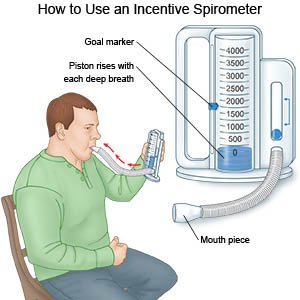Rib Contusion
Medically reviewed by Drugs.com. Last updated on Aug 4, 2025.
AMBULATORY CARE:
A rib contusion
is a bruise that appears on the skin over your rib cage after an injury. A bruise happens when small blood vessels tear but skin does not. Blood leaks into nearby tissue, such as soft tissue or muscle.
Common signs and symptoms of a rib contusion:
- An area that may be black, blue, red, or darker than the skin around it
- Pain that increases when you touch the bruise, breathe, cough, or laugh
- Swelling, tenderness, or a lump at the site of the bruise or near it
- Muscle spasms
Seek care immediately if:
- You have increased chest pain.
- You have shortness of breath.
- You start to cough up blood.
- Your pain does not improve with pain medicine.
Call your doctor if:
- You find a new lump in the injured area.
- Your symptoms do not improve with treatment.
- You have questions or concerns about your condition or care.
Treatment
may not be needed. The bruise may become lighter or change to green or yellow as it heals. You may need any of the following if the contusion is severe or does not heal easily:
- Medicine may be needed to treat or prevent pain or swelling.
- Aspiration is a procedure to drain pooled blood in your muscle. This prevents increased pressure in the muscle.
- Surgery may be done to repair a tear in the muscle or relieve pressure in the muscle caused by swelling.
Manage a rib contusion:
- Rest as directed. Do not play sports or have physical activity until your healthcare provider says it is okay.
- Apply ice to decrease swelling and pain. Use an ice pack, or put crushed ice in a plastic bag. Cover the bag with a towel before you place it on your bruise. Apply ice for 15 to 20 minutes every hour, or as directed.
- Do deep breathing exercises as directed to prevent pneumonia:
- Take 10 deep breaths every hour, even when you wake up during the night. Brace your ribs with your hands or a pillow while you take deep breaths or cough. This will help decrease your pain.
- You may need to use an incentive spirometer to help you take deeper breaths. Put the plastic piece into your mouth and take a deep breath. Hold your breath as long as you can. Then let out your breath. Do this 10 times in a row every hour while you are awake.

- Do not drink alcohol as directed. Alcohol may slow healing.
- Do not stretch your upper body right after your injury. Ask your healthcare provider when and how you may safely stretch after your injury. Gentle stretches can help increase your flexibility.
- Do not massage the area or put heating pads on the bruise right after your injury. Heat and massage may slow healing. Your healthcare provider may tell you to apply heat after several days. At that time, heat will start to help the injury heal.
Prevent a rib contusion:
- Stretch and warm up before you play sports or exercise.
- Wear protective gear when you play sports, such as padding.
- If you begin a new physical activity, start slowly to give your body a chance to adjust.
Follow up with your doctor as directed:
Write down your questions so you remember to ask them during your visits.
© Copyright Merative 2025 Information is for End User's use only and may not be sold, redistributed or otherwise used for commercial purposes.
The above information is an educational aid only. It is not intended as medical advice for individual conditions or treatments. Talk to your doctor, nurse or pharmacist before following any medical regimen to see if it is safe and effective for you.
Further information
Always consult your healthcare provider to ensure the information displayed on this page applies to your personal circumstances.
